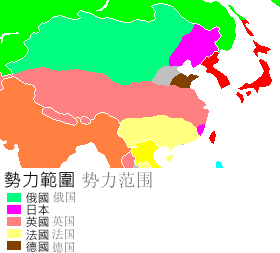

The Scramble for China,[1] also known as the Partition of China[2] or the Scramble for Concessions,[3] was a concept that existed during the late 1890s in Europe and the United States for the partitioning of China under the Qing dynasty as their own spheres of influence, during the era of "New Imperialism". However, the United States Secretary of State created the Open Door Policy in 1899 which sought to prevent the European powers from trying to carve up China into colonies and proposed that all interested powers had equal access to China.[4] The policy was gradually accepted by the major powers so that the concept of the partitioning of China generally lost favor by the early 20th century.
Chinese press routinely described the scramble as the "carving up of the melon" (瓜分),[5] and modern Chinese writers usually consider such events in China part of the century of humiliation that began with the First Opium War (1839–1842) and ended with China established as a great power in 1945 or the founding of the People's Republic of China in 1949. Marxist historians in China considered China during this period a semi-colony because of the domination by the Western countries.[6] On the other hand, the Scramble for Africa by the Western European powers also appeared around the same time, which resulted in the direct colonization of almost all of the African continent by 1914.
- ^ Robert A. Bickers (2015). The Scramble for China: Foreign Devils in the Qing Empire, 1832–1914. Royal Pavilion & Museums. ISBN 9788184246834.
- ^ Public Opinion: A Weekly Review of Current Thought and Activity, Volume 74. G. Cole. 1898. p. 359.
- ^ "The Unequal Treaties System" (PDF). Retrieved March 25, 2024.
- ^ "The Open Door Note and The Open Door Policy". Retrieved March 25, 2024.
- ^ Esherick, Joseph (2006). Empire to Nation: Historical Perspectives on the Making of the Modern World. Rowman & Littlefield. p. 229. ISBN 9780742540316.
- ^ Li, Lin (2021). "Repatriation, colonialism, and decolonization in China". Icofom Study Series (49–2): 147–163. doi:10.4000/iss.3818. Retrieved March 25, 2024.
© MMXXIII Rich X Search. We shall prevail. All rights reserved. Rich X Search
